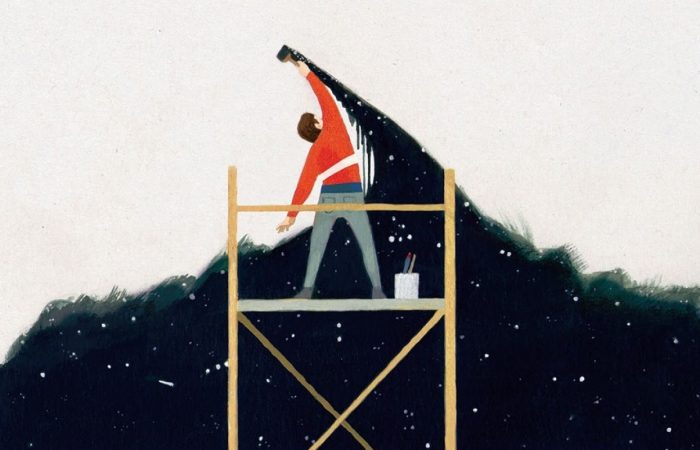
The Difference Between Telling Stories and Storytelling
By Moriah Kofsky
My name is Moriah (Mo-Rye-Ah) everywhere except the Saxbys on 40th and Locust. The barista there has known me as Moira (Moy-Ra) for a year now. “Medium cold brew for Moira!” I politely smile and take my medium cold brew from the granite countertop like the woman of Irish descent I’m not.
I live with an intention to be authentic in all realms of my life; knowing what that looks like, feels like, and willing to act in accordance with it even when it feels vulnerable. However if I heard the name Moira shouted on the street, I would turn my head searching for who shouted my name.
Over the past year I sketched a few versions of the scene where I practice what I preach and correct the barista. They begin at 8:45 a.m. Beads of sweat dot my back like raindrops on a window from my walk to Saxbys in August’s heady heat. When I step into Saxbys and order my drink, the air conditioning feels stale.
Take One: Unconvincing but Succinct
“Medium cold brew for Moira!” “Thanks and by the way, just realized my birth certificate says Moriah!”
Take Two: Avoidant but Effective
“Medium cold brew for Moira!” Moriah squeaks, “Thank you and (*nervous laughter*) my name is Moriah!” * Moriah scurries away, only to be seen at the Starbucks across the street from now on*
Take Three: Aggressive but Assertive
“Medium cold- “MY NAME IS MORIAH.” *Customers stare with raised eyebrows and wide eyes* *Last drips of iced coffee are heard being slurped through a straw*
Ultimately, I cringe at every imagined scenario. I have little reservation confronting men who catcall me, quitting a job that doesn’t fulfill my passion, or sharing a poem I wrote. But with this I’m in too deep.
Like living authentically through our actions, writing authentically can be uncomfortable, especially when the concept is uncharted territory. Every word written removes a layer of comfort: a layer of clothing. Baring our soul is like getting naked.
And when we get naked, we expect someone to at least look at us. So when my bravery is unacknowledged or denounced, I am left with great disquietude. I feel like a burden, I feel embarrassed. My first inclination is to apologize. But why should we ever apologize for honesty?
I used to write half-truths for the fear of being judged. Not only by others but also by my own ego. I’ve seen businesses such as Macy’s, Foot Locker, and Best Buy also lack in authentic narratives, failing to define themselves beyond bargains and buzzwords. Contrast these businesses to ones like Patagonia, Warby Parker, and Etsy where strong, authentic narratives are delivered through every interaction with the brand.
To be a storyteller instead of someone who tells stories, your story does not have to be grotesque, grandiose, or sophisticated. It has to be your authentic truth.
“Your silence will not protect you.” Audre Lorde says it best. And especially in the context of branding, I would go as far to say that your silence will hurt you.
Authenticity is an intangible idea with tangible results when accomplished. When aiming to write in congruence with my truest self, I find it helpful to consider the following:
Know your Values: You cannot write authentically if you don’t know what you value. To do this, try identifying times when you were happiest, times you were fulfilled, and times you were proud. Once you’ve identified them, discern what aspects of those times contributed to the emotion.
Trust your Intuition: Notice the visceral sensations when you answer to your highest self. Notice them when you don’t.
Do Not Judge Yourself: We may not like what surfaces when we’re being authentic and that’s okay. Notice, internalize, but don’t judge.
Finish the Following Sentence: “If this person really knew me, they would know….”
A previous professor gave me The Love of My Life by Cheryl Strayed (the author most known for her book, Wild), hoping I would enjoy it. I stuck it in a folder and felt it out when finishing up my homework around 3:00 a.m. My eyes glazed over the first sentence of the piece: “The first time I cheated on my husband, my mother had been dead for exactly one week.” Next thing I knew it was around 3:45.
The first sentence in The Love of My Life offers only a peak into Cheryl Strayed’s raw, authentic writing. Her honesty is simple but hypnotizing.
Imagine writing with the same raw honesty. You breathe life into your piece and it breathes you. Each sentence becomes a puzzle you arrange and rearrange so the pieces fit. You glance at the clock and the hours become obsolete.
Moriah Kofsky is an Associate at Woden. Whatever your storytelling needs may be, let Woden help. Download our free Storytelling Blueprint, or send us an email at connect@wodenworks.com to discuss how we can help tell your story.


